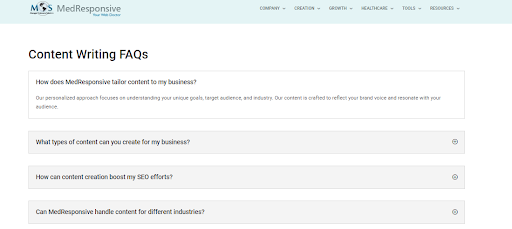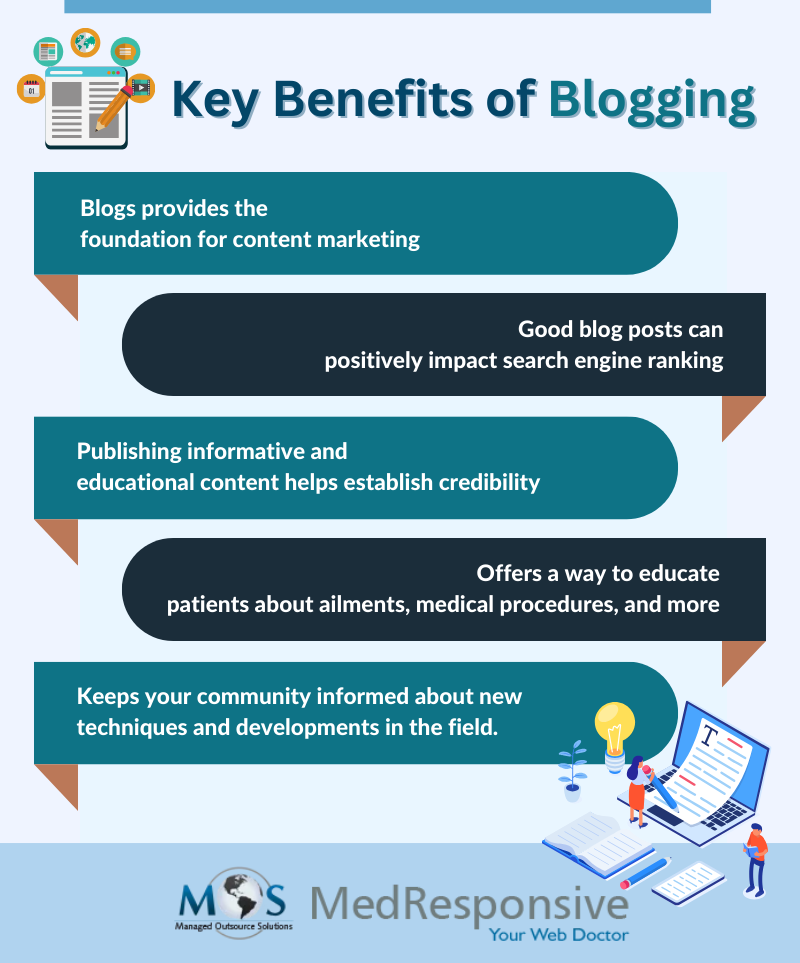A key component of a website for a medical practice is blogging, which is a powerful tool for online medical marketing. Not only can blog articles help promote your practice and improve your internet presence, but they also enable you to rank higher in organic search results. Many also turn to blogging as a way to combat the deluge of online medical misinformation. Leveraging professional medical SEO services can increase the credibility and authority of your website.
Significance of Blogging for Healthcare Businesses
In today’s hectic and fast-paced healthcare environment, many medical practitioners do not find time to create blog posts as they focus on managing patient appointments and providing care. What they may not fully realize is that physicians who publish blogs have a distinctive advantage over those who do not. Blogs improve your medical SEO, position you as a subject matter expert in your industry, and encourage search engines to crawl your website more often. Effective blogging can draw attention to your healthcare website by boosting the content to the top of search results, where it will be prominently displayed for anyone looking for your medical services. Once visitors click on the link to your blog, you have the chance to capture their interest and win them over as new patients.
Blogs not only help your website rank well in search results, but they also assist in developing relationships with both current and potential patients. They can help connect with potential patients by establishing the physician or the practice as an authority in their industry and even by producing internet reviews for medical professionals.
Blogs also help your audience to find your medical practice. Blogging helps differentiate your business from competing medical practices and offers your patients information they are seeking. It’s a means of informing, educating, and sharing vital information with your patients about their health and medical needs. It also serves as the foundation for your social media activity.
Tips to Succeed with Medical Blogging
- Choose appropriate topics: Create content that will appeal to your audience. Rather than attempting to rank for keywords targeted by more authoritative websites, use tools like Ahrefs, to identify the niche keywords that will help you rank faster and in a better position. Stories of patient experiences might be useful in providing a relatable framework for a complex medical topic. Blogging with advice and action in mind is another method to interact with your readers. Instead of just talking about the signs and symptoms of a herniated disc, it is better to provide a list of recommendations for managing discomfort.
- Publish the right content to reach the right people: The healthcare space is competitive and there are numerous blogs out there on medical content. You need to keep up with the pace by consistently posting informative articles. The content has to resonate with the target audience. You can add patient stories that explain a complex medical subject with simplified relatable content. It should connect with the readers and help generate prospective clients. Sharing a synopsis of the application of a particular technology in improving a patient’s life is also an effective marketing strategy. What you need to focus on is constantly engaging with your audience. Actionable and advice-based blogs can get this job done. Ensure that when you create content for healthcare websites, you are mapping the content around the journey of the buyer. The blogging stage has a significant role in digital marketing. Digital marketing services are essential to carefully curate content to reach out to current and prospective patients.
- Identify your target audience: When sitting down to write a blog, first and foremost identify your primary audience. Know who you will be talking to (whether the general public, patients, doctors or decision makers), what type of people might be interested in reading your medical blog, think about their age, education level and health status and other relevant aspects. Typically, with a healthcare blog, you will be targeting current and prospective patients. Understanding the demographics of your audience can help you shape the important elements of your blog based on their unique interests. For example, if you are writing a blog about post-graduate medical training, you can take it for granted that physicians will know what “residency” is, but if you are writing for the general public, you can’t make that general assumption. The type of approach to be opted towards writing may depend on target audiences. While decision makers may respond well to blogs that focus on cost and other policy issues, patients are often more interested in how your blog relates to their care.
- Hook your readers: When generating blog ideas, fine tune your topics. Instead of writing a generic healthcare post, narrow it down to a specific health condition, news event or trend. To stand out, you need to hook your readers from the very first line itself. One effective tool for capturing your audience’s attention is to make a bold or provocative statement right at the beginning. If you are successful in capturing the reader’s interest within the first two to three lines, there is a much better chance that they will read the full blog towards the end.
- Avoid medical jargon: For medical content writing, always use plain language. Blogs shouldn’t be the venue to showcase your vocabulary skills or your command over acronyms. Never say with one long sentence what you could instead say in two short sentences. People may not really take the time to read the rest of your blog post, if they are stuffed with overly complex and long sentences. On an average, readers spend only 2 minutes reading a blog post. So, your blog content should be easily comprehensible to readers. Make sure to edit or avoid complex sentences and technical medical jargon.
- Write like you talk: When it comes to blogging, especially for medical practices, the tone and style of your writing are crucial. Think of your blog as a conversation with your readers. Instead of delivering information in a stiff, formal manner, aim to write as if you’re having a friendly chat. This conversational approach makes your content more relatable and accessible, helping your readers feel like you’re speaking directly to them. It’s as if you’re sitting down with them, addressing their concerns, and offering solutions they can trust. This personal connection is key to building a loyal readership. When readers feel understood and valued, they’re more likely to return to your blog, engage with your content, and even recommend your practice to others. Writing like you talk not only humanizes your practice but also fosters a sense of community and trust with your audience.
- Add keywords: Insert several targeted SEO keywords and key phrases. For example, if you are writing about dental braces, try to include other specific terms like orthodontics or tips on how to get straighter teeth. In addition, your business may be serving a specific or multiple geographic regions. Be sure to include your location and any nearby points of interest throughout some of the business blogs.
- Determine the ideal posting time: It is essential to adhere to a calendar in order to standardize your blogging initiative. Your marketing team can focus their efforts on campaigns and subjects by keeping an editorial calendar. When your titles and themes are all in one place, it is easier to keep an eye on your postings and it also reduces the possibility of repetitive or duplicate content. Though there are many tools available, you can maintain the structure and organization of your content efforts even if you only start with a basic Google Sheet. Sort your blogs according to campaign, industry, title, and topic to make sure everything is covered and nothing is being repeated.
- Include expert interviews, infographics and testimonials: Medical blog posts must ideally include expert interviews, infographics and testimonials. Expert interviews conducted via Skype or Google Hangouts offer your blog audience the opportunity to learn from the experiences and thoughts of experts. Create attractive and educational infographics content that capture the attention of your audience.
Here’s an instance –
Testimonials can help boost the credibility of your healthcare organization. You can mention quotes from patients in your regular blog posts, or even combine several reviews into one post.
To boost the credibility of written reviews, be sure to include the name and photo of the reviewer.
- Include images: Integrating pictures and graphics can also aid in content division. Include a chart or graph to provide a visual picture of the numbers when you present them. Providing your readers with a variety of options will help your material reach a wider audience because different people digest information in various ways.
- Include videos: A lot of people would rather watch a video than read a long blog piece. Think about creating a little video that uses graphics or bullet points to highlight several of the main ideas in your article. You could want to save your best-performing material for your films as they can need a large time and financial commitment.
- Check the layout on your phone: Currently, half of all internet traffic is generated on mobile devices. You can find out exactly how much of your website’s traffic originates from mobile devices by using Google Analytics. Make sure your material is readable on all platforms to avoid alienating users who want to read it but can’t because of the small screen size.
- Add FAQs in your blog post, if needed: When writing a blog post, especially on complex or detailed topics, you might stumble upon questions or sub-topics that are worth addressing but don’t have enough content for their own full section. This is where a “Frequently Asked Questions” (FAQ) section can come in handy. By including an FAQ section at the end of your post, you can efficiently address these smaller, yet relevant, points without disrupting the flow of your main content. Each FAQ can be a concise 2-5 sentence response that offers quick insights or clarifications. This approach not only enhances the value of your post by covering more ground but also makes your content more user-friendly. It’s an optional addition, but when used appropriately, an FAQ section can be a great way to address lingering questions, provide extra detail, and ensure your readers leave with all the information they need. This small effort can significantly improve reader satisfaction, helping to solidify your blog as a comprehensive and reliable resource.

- Call-to-action to stimulate prospects: Your digital marketing strategy is a success if the prospects turn into your customers. To make this possible, you need to add call-to-action in your content. You can use tools like graphics and buttons to prompt readers to perform a specific action. The call-to-action can be in the form of an instruction or directive. Embed your call-to-action throughout your blog posts and social media posts. A compelling blog for a healthcare website is incomplete without a call-to-action section.
- Post blog entries regularly: On websites for doctors, at least one or two blogs should be posted each month to remain successful and current. By doing this, you’ll maintain your practice’s relevance in the eyes of search engines, which are always looking for fresh, engaging information. Patients who browse blogs and visit medical websites will also anticipate new content, at least once a month. If blog postings are too old, readers may quit reading them. For a busy doctor, it might be challenging to keep up with even monthly posts. Professionals with experience in incorporating content writing services that are relevant to your field of expertise and practice should ideally handle this.
- Concluding your healthcare blog post in such a way that it moves the reader to the next step: You have to conclude the blog post with a positive note, giving no room for skepticism and confusion among the readers. It should strive to build relationships with the prospects. Whatever the content, the conclusion has to specify the benefits the readers can reap with your products or services. You can make the conclusion of the content more actionable by making them know the advantage when they ascend next to the sales pipeline. This can drastically improve your lead generation results. Again, mention what is unique about your product or service.
When you start writing a blog, try to have a tight focus. Generally, it is quite tempting to stuff everything about a specific topic into a single blog. However, the result will be confusing or unengaging. If you are relatively new to blogging, mastering the above-listed tips is a great way to start. As you become more experienced, you will start to develop a sense of when you can bend the rules, and when you cannot. You can also reach out to medical SEO services to generate more compelling blogs for your healthcare website.






